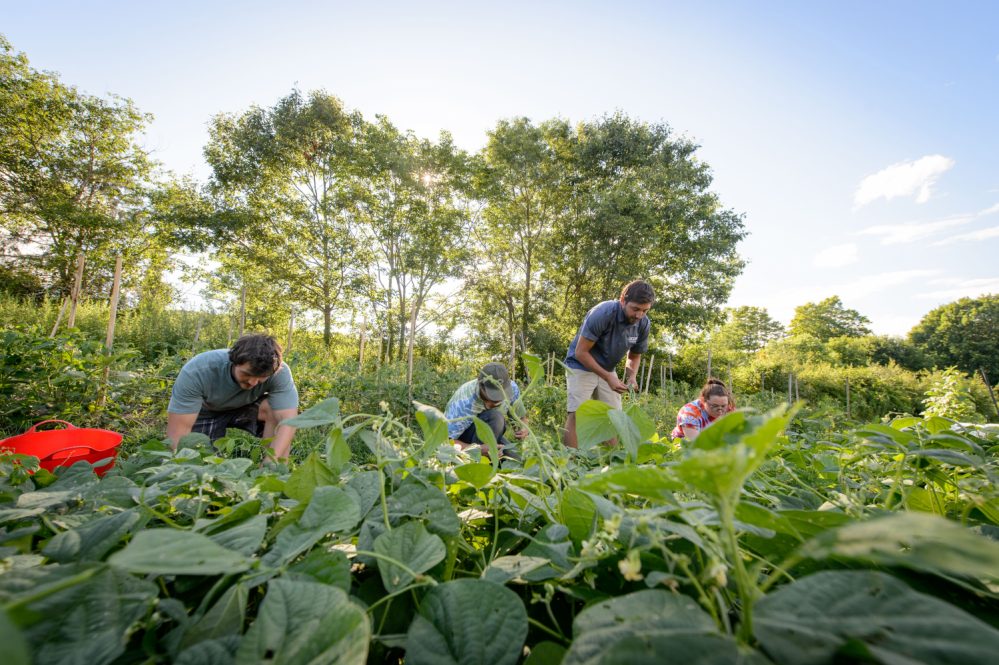As students around Connecticut headed back to school this month, reading, writing, and arithmetic are obviously front of mind. But UConn Extension programming supporting Farm to School initiatives seeks to ensure the health of students’ bodies as well as their minds.
Part of the College of Agriculture, Health and Natural Resources, UConn Extension provides critical support for Farm to School initiatives throughout the state. One such program is Put Local on Your Tray. This program, which has been running since 2014, connects Connecticut school districts with local farmers.
Over the course of the school year, Put Local on Your Tray works with 25 districts to help them to “source, serve, and celebrate” local food in their cafeterias.
“Working closely with a school’s food director and their team to set goals and then supporting them in meeting their own goals through our technical assistance and seasonal promotions is a realistic way to move districts forward at a pace that works for them,” says Jiff Martin, UConn Extension educator in sustainable food systems and program director of Put Local On Your Tray.
One popular strategy to introduce students to local flavors is taste tests. Put Local on Your Tray helps school food administrators set up taste tests, allowing students to give feedback about what foods they like best and get engaged with the products available right here in Connecticut. The program also promotes seasonal campaigns for school districts, including CT Grown for CT Kids Week coming up in early October, Rooting For Winter, the Great Smoothie Slurp, and Native American Foodways.
UConn Extension also works with schools to determine what culturally relevant meals the school could incorporate into their menus based on the demographics of the student population. For example, they recently held a taste test in Middletown with Mexican street corn.
“That’s a really great way to include corn which is such a cultural food especially in our region and then to give it that flair that really spoke to that community of students,” says Abigail DuBois, UConn Extension public service technician and campaigns coordinator.
The program maintains a Farm to School Directory which lists farms across the state that are hoping to sell to schools. The directory also includes information about whether farms are open to hosting field trips or able to deliver directly to schools. The program also supplies schools and farmers with conversation guides and tool kits to help them communicate effectively and speak each other’s language.
“The directory is a great way for farmers to get their product out there and for schools to gauge what they want to do,” says DuBois.
Ideally, farms are in the same town as the school, so that students see the connection and might even visit the farm with their families. When that is not possible, UConn Extension helps to connect schools to farms in the region or to organizations like the Northwest Connecticut Food Hub. The Food Hub collects food from farmers throughout the state and delivers it to schools.
Now, Extension is using their years of experience to partner with the Connecticut Department of Education for the implementation of the Local Food for Schools Implementation Program. The program will provide federal funding to all Connecticut schools for the purchase of locally grown products.
“Thanks to this new infusion of federal dollars, we’re excited to assist so many new districts in finding locally grown products to serve on their cafeteria menus,” Martin says. “We have been working toward this moment since 2014.”
Depending on their size, districts will receive between $2,000 and $20,000 through the new program.
This year, the Connecticut legislature passed a law creating its own incentive program that aims to continue this effort after the one-year federal funding runs out.
This state-level investment comes two years after the establishment of the CT Grown for CT Kids grant program administered by the Connecticut Department of Agriculture. This grant program provides funds to school districts, non-profits, farmers, and early care providers to implement activities that help grow farm to school programming. Martin works with the state agency to provide coaching to grant applicants.
“Over the past two years, the Connecticut Grown for Connecticut Kids Grant program has experienced tremendous response with more than $677,000 committed to 45 projects,” says Agriculture Commissioner Bryan P. Hurlburt. “Leveraging all of these opportunities in a cohesive approach with partners is systemically building robust farm to school programming which provides students with access to fresh, nutritious CT Grown foods and education about nutrition, food, and health at the same time.”
In addition to the Connecticut Departments of Education and Agriculture, Extension is also working with the Connecticut Department of Public Health to establish programs with early childhood providers. Other collaborators include the CT Farm to School Collaborative, FoodCorps, and New England Dairy.
This work relates to CAHNR’s Strategic Vision area focused on Ensuring a Vibrant and Sustainable Agricultural Industry and Food Supply.
Follow UConn CAHNR on social media



